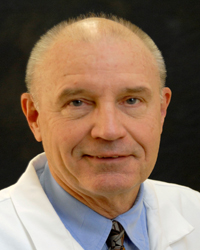Clayco’s chairman and CEO, Robert G. Clark, along with the company’s partners, have committed $4.1 million to Washington University School of Medicine in St. Louis to advance research into a rare blood vessel disease that results in death five to 10 years following diagnosis.
The gift – which has been committed through The Clayco Foundation — will fund research in the laboratory of John P. Atkinson, MD, the Samuel B. Grant Professor of Medicine and chief of the Division of Rheumatology. Atkinson, who treats patients at Barnes-Jewish Hospital, was part of a team that originally identified the disease — cerebroretinal vasculopathy (CRV) — in 1988 and, in 2007, the genetic defect that causes it. The disease is caused by the progressive loss of small blood vessels in the brain and retinas.

Additionally, The Clayco Foundation is donating $25,000 to support an international CRV symposium sponsored by the School of Medicine.
Rare diseases such as CRV often receive scant attention and modest research funding, despite the fact that research into such disorders often leads to findings and treatments relative to more common diseases.
Typically striking patients in midlife, CRV results in mini-strokes in the brain that cause progressive central nervous system degeneration. Symptoms such as impaired vision, cognitive decline and motor impairment often lead to patients being misdiagnosed with multiple sclerosis, brain tumors or strokes.
“This generous gift by longtime supporter Bob Clark officially establishes Washington University as the world’s leader in CRV research and related diseases,” said David H. Perlmutter, MD, the School of Medicine’s new dean and executive vice chancellor for medical affairs. “We are committed to better understanding and, through a continued and dedicated research focus, improving the lives of people affected by this disease.”
Clark’s experience with the disease is personal. His first wife, Ellen S. Clark, a mother of five and a grandmother of three, succumbed to CRV in 2010, at age 50.
Since then, under Atkinson’s leadership, Washington University researchers have developed a simple blood test to identify defects in the CRV gene.
He and his colleagues also have established a mouse model to study the disease, leading to a breakthrough in 2015 that identified potential therapeutic agents. The researchers plan to expand studies using the mouse model as well as cells from patients with the disease as part of an upcoming clinical trial.
“We want patients with CRV to have hope,” said Clark, head of the Chicago-based Clayco, one of the nation’s largest design-build firms. “I am forever grateful to Washington University School of Medicine for helping to diagnose my wife’s genetic disorder and for the care she was given. We had visited specialists across the country and had no success until we came to the university.”
To honor his wife, Clark made an earlier gift to the university to construct the Ellen S. Clark Hope Plaza, a reflecting pool with native landscaping that welcomes visitors to the BJC Institute of Health and surrounding buildings on the Medical Campus. The plaza’s landscape and water feature was designed by world-renowned artist Maya Lin, best known for designing the Vietnam Veteran’s Memorial in Washington.
A longtime supporter of Washington University, Clark serves on the National Council for the School of Medicine and on the board of the Central Institute for the Deaf. He was instrumental in successfully orchestrating the merger of the Central Institute for the Deaf’s research and faculty programs in hearing and deafness with the School of Medicine’s Department of Otolaryngology, creating the CID at Washington University School of Medicine.
Progress against CRV also may mean advances against other diseases related to blood vessel deterioration, including aging, macular degeneration, Alzheimer’s disease and diabetic retinopathy, among other conditions. While Atkinson’s research will be housed at the School of Medicine, he will collaborate with other leading CRV researchers at the University of Texas Southwestern Medical Center and the National Institutes of Health (NIH).
“I am grateful to Bob Clark and The Clayco Foundation for their very generous commitment,” Atkinson said. “We have made great progress in understanding CRV and are hopeful that we will find a treatment for this devastating disease.”